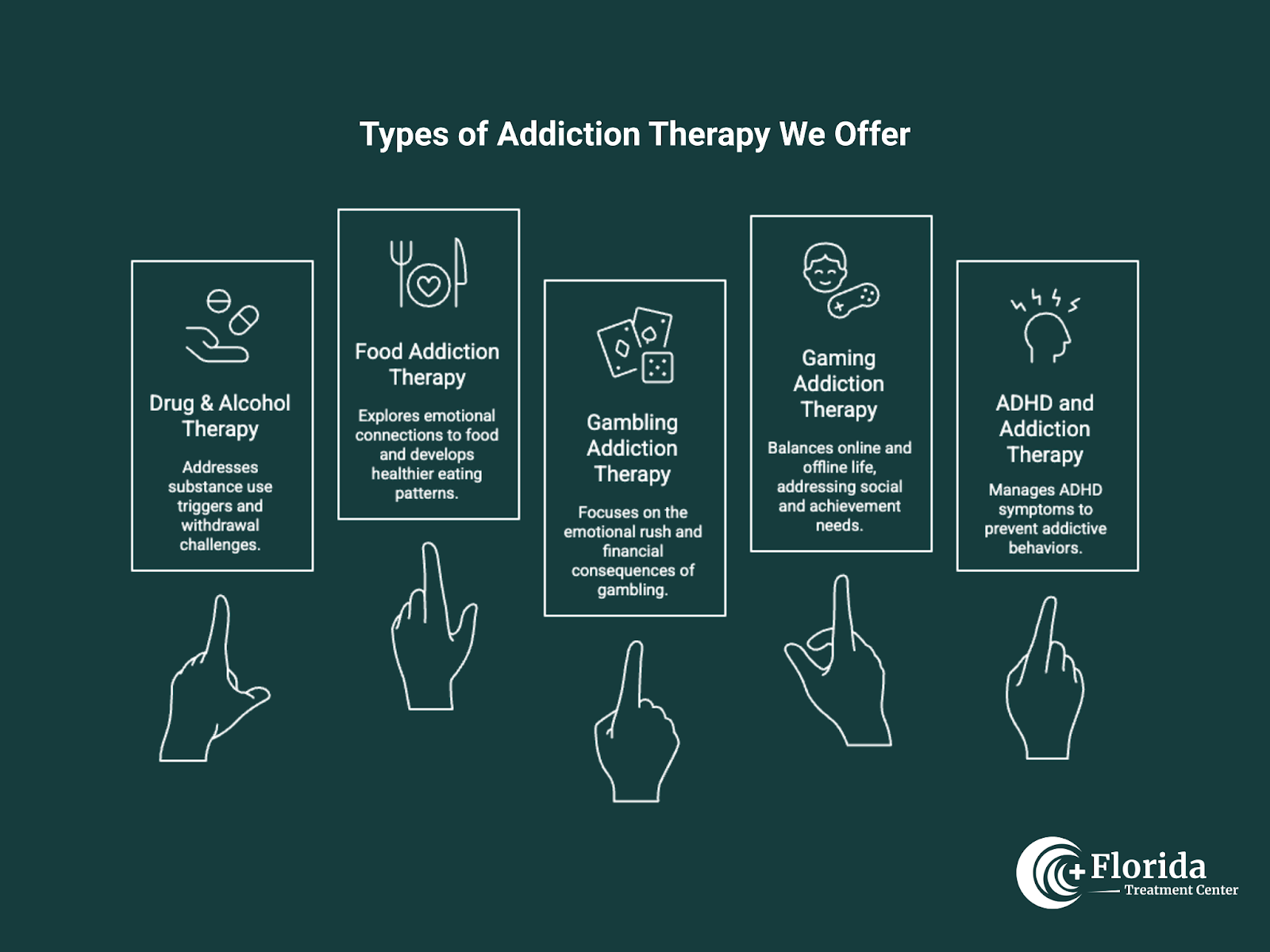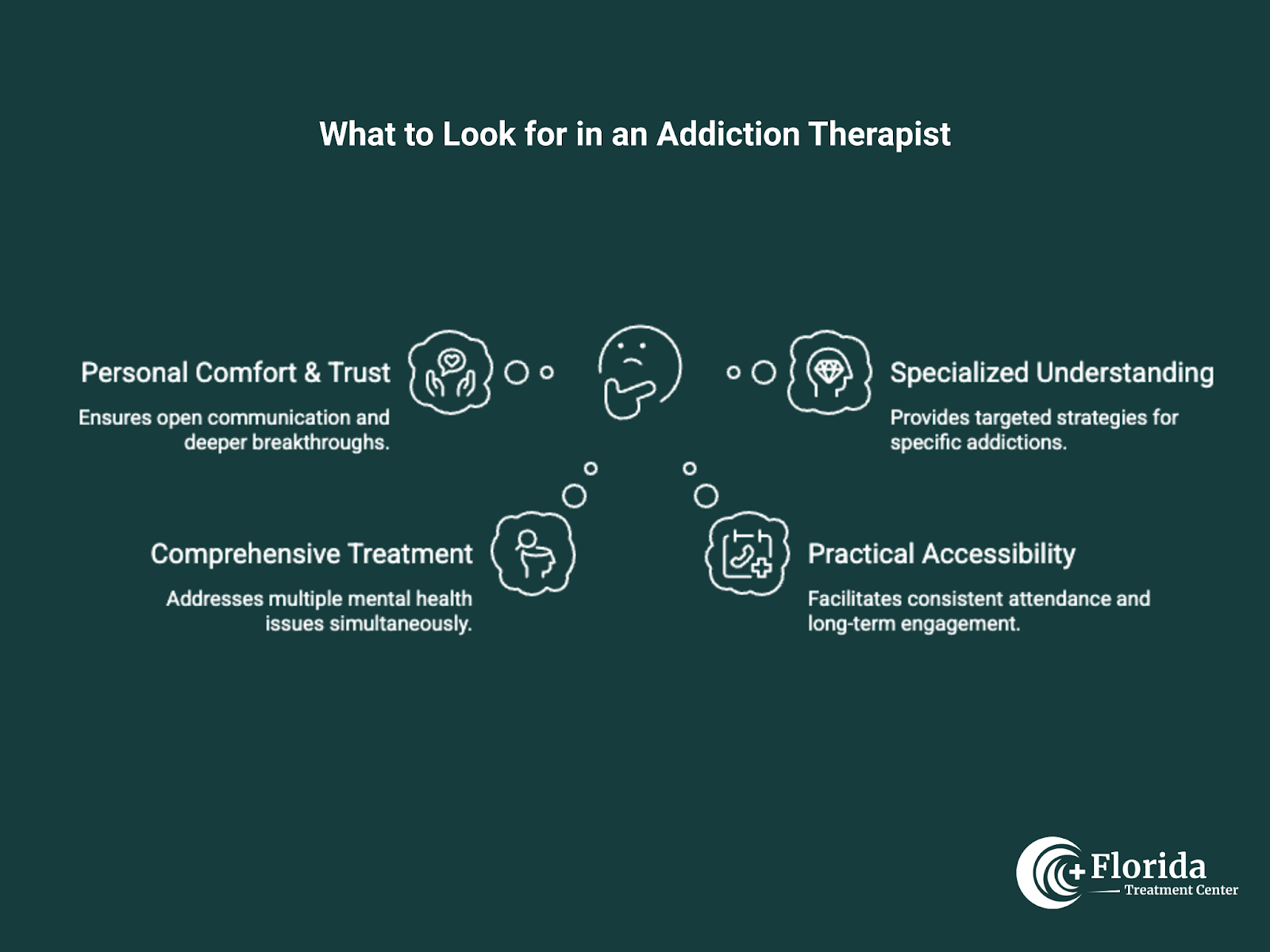Let's be honest: admitting you need help with addiction is tough. Maybe you've been Googling "addiction therapists near me" at 2 AM, wondering if anyone really understands what you're going through. The good news? You're not alone, and finding the right therapist can completely change your recovery story. Here in Tampa, we've seen hundreds of people walk through our doors at Florida Treatment Center, each with their own unique struggle. Some are dealing with alcohol, others with prescription pills, food issues, or even things like gambling that have spiraled out of control. What they all have in common is this: they decided to stop fighting addiction alone.
Think of an addictions therapist as someone who speaks your language, the language of addiction. Sure, your regular therapist might be great for anxiety or relationship problems, but a therapist specializing in addiction gets the specific hell you're going through. Here's the thing: addiction hijacks your brain in ways that regular therapy just doesn't address. When you're sitting across from someone who truly understands why you relapsed after 90 days, or why seeing your old dealer still makes your heart race two years later, it hits different. These specialists have spent years studying not just psychology, but the actual neuroscience of addiction. They know why your brain keeps telling you "just one more time" even when logically you know better. More importantly, they know how to help you rewire those thought patterns. The difference between general therapy and addiction-specific treatment? It's like the difference between someone who's read about swimming versus an actual lifeguard. Both might care about you not drowning, but only one really knows how to pull you to safety when you're going under. Recovery isn't just about stopping the substance or behavior. It's about learning to live again. That's where therapy becomes your GPS for navigating a life you might not remember how to live sober.
Every addiction has its own fingerprint. What works for someone battling cocaine might not work for someone whose poison is the poker table. That's why we don't do cookie-cutter treatment here.

Our alcohol addiction approach isn't about lecturing you on why drinking is bad, trust me, you already know that. It's about figuring out what's driving you to the bottle (or the pills, or whatever your substance of choice is) in the first place. We'll dig into your triggers. Maybe it's that specific bar where everyone knows your name. Maybe it's Sunday afternoons when the loneliness hits. Or maybe it's that particular friend who always seems to have "just one drink" suggestions. Withdrawal is brutal, physically and mentally. Our therapists have been through this rodeo enough times to know what week three looks like, what month six feels like, and how to help you white-knuckle through those moments when everything in your body is screaming for relief.
The relapse prevention stuff? It's not just "have a plan." It's about building an entirely new life structure that doesn't revolve around getting high or drunk. We help you identify your personal red flags before you're already halfway to the liquor store.
A food addiction therapist near me knows that "just eat less" is about as helpful as telling someone with depression to "just be happy." Our food addiction therapist gets that your relationship with food is complicated, emotional, and often rooted in stuff that happened way before you ever binged on a sleeve of cookies. Food addiction isn't about willpower. It's about understanding why you eat your feelings instead of feeling them. Maybe you learned that food was comfort when nothing else was safe. Maybe restricting food gives you a sense of control when everything else feels chaotic. We work on the emotional stuff underneath the eating patterns. What does food represent for you? Safety? Reward? Punishment? Numbness? Once we figure that out, we can start building healthier ways to meet those same emotional needs.
Finding a gambling addiction therapist near you who really gets it isn't easy. Most people think gambling addiction is just about money, but our gambling addiction therapist knows it's actually about that rush, that escape, that moment when nothing else matters except the possibility of winning. The financial damage is usually obvious: maxed credit cards, borrowed money, maybe some relationships that got torched along the way. But the emotional damage runs deeper. The shame spiral of losing your kid's college fund, lying to your spouse about where you were last night, or that sick feeling in your stomach when you realize you've done it again. We help you understand what you're really chasing when you sit down at that poker table or buy another scratch-off. Is it excitement? Escape from problems? The fantasy of solving all your financial troubles with one big win? Once we know what gambling is really doing for you emotionally, we can find healthier ways to meet those needs.
A gaming addiction therapist faces unique challenges because, let's face it, everyone games these days. The difference between enjoying video games and being addicted is usually about what's happening in your real life. When your online friends feel more real than your actual family, when you're calling in sick to work for raid night, or when you realize you haven't left the house in three days because you've been grinding levels. That's when gaming stops being fun and starts being a problem. We don't just set screen time limits (though that might be part of it). We look at what gaming gives you that real life isn't providing. Achievement? Social connection? A sense of purpose? Escape from anxiety or depression? Then we work on building those things into your offline world.
An adhd addiction therapist near me understands that having ADHD makes you about twice as likely to develop an addiction. Your brain is already wired differently. You need more stimulation, you struggle with impulse control, and you probably use substances or behaviors to self-medicate symptoms that might not even be diagnosed yet. The tricky part is that a lot of ADHD medications are stimulants, which can be problematic if you have a history of substance abuse. We work closely with psychiatrists to figure out treatment approaches that address your ADHD without triggering addictive behaviors. Plus, ADHD makes recovery harder in practical ways. Remembering to take your recovery seriously when your brain constantly seeks the next shiny thing? Staying organized enough to maintain sobriety routines? These aren't character flaws. They're neurological challenges that need specific strategies.
Picking a therapist is like dating, except the stakes are higher and hopefully there's less ghosting involved. Here's what actually matters:

Sure, you want someone licensed with addiction specialization, but if you can't stand talking to them, those degrees won't help. When you actually like your therapist and feel safe opening up, you'll share the real stuff instead of just skating on the surface. That's where the breakthroughs happen.
A gambling specialist gets why you chase that rush in ways a general addiction counselor might not. Someone who's worked with hundreds of alcoholics knows your triggers before you even finish describing them. This isn't just nice to have – it means faster progress with strategies that actually work for your situation.
Most people aren't dealing with just addiction. There's usually anxiety, depression, or trauma mixed in. You want someone who can handle the whole mess at once instead of treating everything separately. Otherwise, you're just playing whack-a-mole with your problems.
The world's best therapist won't help if you can't consistently show up. When appointments fit your life instead of disrupting it, you actually stick with treatment long enough for it to work.
Generic addiction advice is everywhere: "just don't drink," "find new friends," "get a hobby." But a specialist? They know that your Tuesday afternoon craving isn't the same as your Friday night urge, and they have different tools for each situation. Your treatment plan becomes actually personal. Not just "here's what works for addiction," but "here's what works for your specific addiction, given your family history, your triggers, your schedule, and your goals." Accountability without judgment. Your addiction therapist has heard it all before. Relapsed after six months? They're not shocked. Used your rent money for drugs? They're not going to lecture you. They're going to help you figure out what went wrong and how to do better next time. Tools that actually work for your situation. Cookie-cutter coping strategies fall apart in real life. Specialists help you develop personalized techniques that fit your lifestyle, personality, and specific challenges.
Tampa's recovery scene has grown a lot over the past few years, which means you have options. Florida Treatment Center sits right in the middle of this, offering different levels of care depending on where you're at in your recovery journey. We've got flexible options because life doesn't stop for recovery. Our Intensive Outpatient Program works for people who need structure but can't commit to residential treatment. Partial Hospitalization gives you comprehensive care while letting you sleep in your own bed. And regular outpatient therapy fits into most work and family schedules. Insurance usually covers this stuff, though navigating benefits can be a nightmare. Our team handles the paperwork and phone calls so you can focus on getting better instead of fighting with insurance companies.
The Tampa recovery community is strong. There are meetings, support groups, and social events specifically for people in recovery. Having that network makes a huge difference when you're building a new life.
Look, I could write another thousand words about treatment approaches and success rates, but here's what really matters: you're reading this because some part of you knows things need to change. We can usually get you in within 24-48 hours because we know that motivation is fragile. When you're ready to make a change, waiting three weeks for an appointment can be the difference between getting help and talking yourself out of it. Your first appointment isn't about committing to anything long-term. It's about figuring out what's really going on and what options make sense for your situation. No pressure, no judgment, just honest conversation about where you're at and where you want to go. Call us, fill out the online form, or just show up. We're here when you're ready. Recovery isn't about being perfect. It's about being willing to try something different. And that willingness? That's enough to get started.
Stay informed about the latest research in psychology.
Find hope in scriptures during addiction recovery. Discover powerful Bible verses for strength and healing compiled by Florida Treatment Center.
Yes, Benadryl addiction is real. Learn the signs, risks, and treatment options for diphenhydramine dependence at Florida Treatment Center.
Wondering if you can get addicted to NyQuil? Yes, you can. Learn the signs of NyQuil dependence, health risks, and how Florida Treatment Center can help.